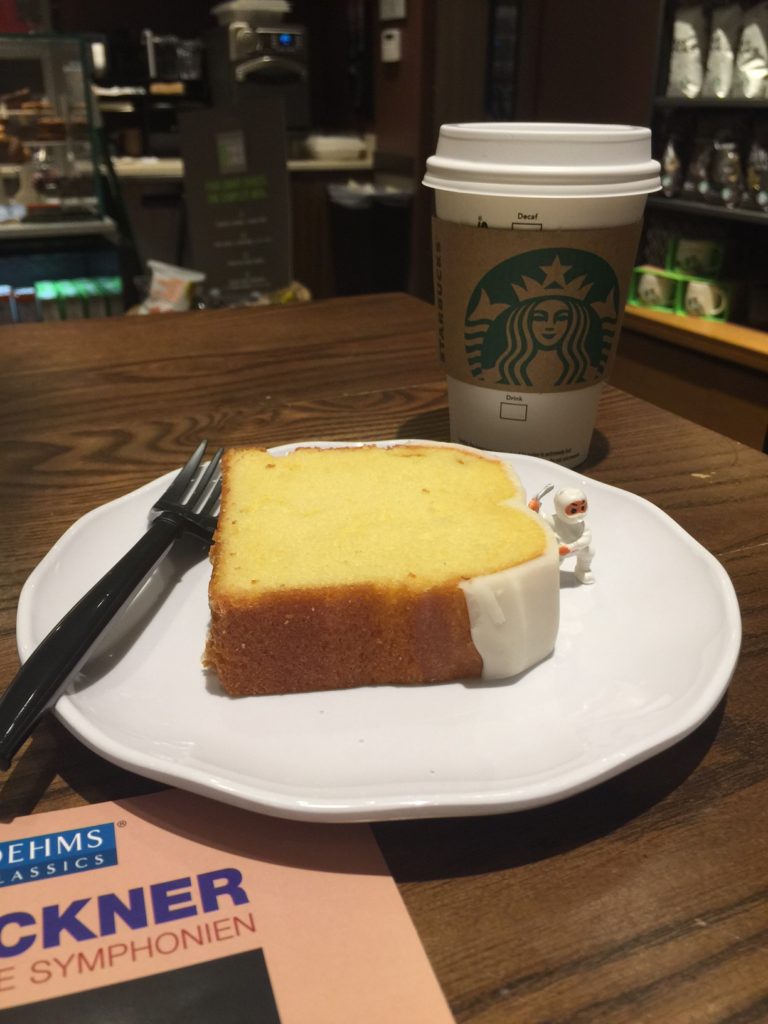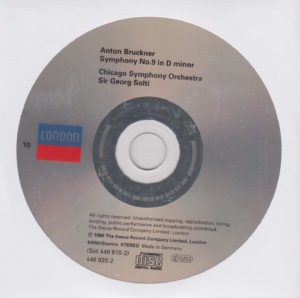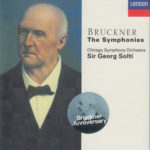 My “office” this morning is a local Starbucks, where me and my ninja are enjoying a slice of Iced Lemon Pound Cake and cup of Blonde Roast Coffee.
My “office” this morning is a local Starbucks, where me and my ninja are enjoying a slice of Iced Lemon Pound Cake and cup of Blonde Roast Coffee.
I took special note that today is Day 142, which means I only have two days left in my 144-day exploration of Bruckner’s symphonies.
After I finish this leg, I’ll total up all the stats – likes, dislikes, ages of conductors, year of recording, etc. – and I’ll post results.
The purpose of this project was to determine which conductor, orchestra, and CD box set most appealed to me. That much I will have accomplished.
But, then, I will start the next leg of my journey – 63 More Days With Bruckner And Me – in which I’ll explore eight more CD box sets, three of which (Celidibache, Furtwangler, and Klemperer) I had to bend the rules a tad to include.
My original criteria was that the CD box set had to include all nine symphonies. The aforementioned conductors only include six in theirs, omitting the first three symphonies. But, given the historicity and/or importance of these conductors, I decided it was best for me to listen to them, if for no other reason than I want to hear conductors of their reputation.
So, that I will do.
Starting in just three days.
 This morning’s conductor of Anton Bruckner’s unfinished Symphony No. 9 in D Minor WAB 109 (dedicated “to the beloved God”) is Hungarian-born Sir Georg Solti (1912-1997), an artist with a long and noteworthy career.
This morning’s conductor of Anton Bruckner’s unfinished Symphony No. 9 in D Minor WAB 109 (dedicated “to the beloved God”) is Hungarian-born Sir Georg Solti (1912-1997), an artist with a long and noteworthy career.
His orchestra for this box set is equally revered: the Chicago Symphony Orchestra.
I first heard Sir Georg Solti on Day 14 of my 144-day journey, Symphony No. 1.
Then again on Day 30, Symphony No. 2.
Then again Day 46, Symphony No. 3.
Then again on Day 62, Symphony No. 4.
Then again on Day 78, Symphony No. 5.
Then again on Day 94, Symphony No. 6.
Then again on Day 110, Symphony No. 7.
Then again, most recently, on Day 126, Symphony No. 8.
In my previous assessments, I pointed out that there’s a lack of information in the CD book regarding the record label. Its name is nowhere to be found. Also, it’s not always complete regarding the versions or the editors (Nowak? Haas? Carrigan?)
 Okay, now on to the objective aspects of this recording:
Okay, now on to the objective aspects of this recording:
Bruckner’s Symphony No. 9 in D Minor WAB 109, composed between 1884-1890
Sir Georg Solti conducts
Solti used the ??? version edited by ??? (I hate it when I can’t find that information anywhere)
Chicago Symphony Orchestra plays
The symphony clocks in at 61:00
This was recorded in September and October of 1985 at the Medinah Temple in Chicago
Solti was 73 when he conducted it
Bruckner was 72 when he died before finishing the Ninth
This recording was released on the London/Decca label
Bruckner wrote his symphonies in four parts. He would have this time, too. But he died before completing movement four. The time breakdown of this one (Symphony No. 9 in D Minor), from this particular conductor (Solti) and this particular orchestra (Chicago Symphony Orchestra) is as follows:
I. Feierlich, misterioso (D minor)…………………………………………………………………23:37
II. Scherzo. Bewegt, lebhaft (D minor); Trio. Schnell (F-sharp major)……………………………………………………………………………………………………………10:22
II. Adagio. Langsam, feierlich (E major)……………………………………………………….26:56
IV. Finale. (D minor, incomplete)……………………………………………………………………0:00
Total running time: 61:00
Okay when you put all this together, what do you get?
My Rating:
Recording quality: 5
Overall musicianship: 5
CD liner notes: 4 (lengthy essays, but incomplete recording/version information)
How does this make me feel: 4
As I’ve noted before, the Chicago Symphony Orchestra can, at times – at least, to my ears – sound a bit piercing in the horn section. That’s not the case in these recordings. Everything is kept just below the brassy level. But just barely.
This performance breezes right along. At 61:00, it’s not the shortest. But it’s far from the longest. I think it’s just about right for three movements.
I like that.
The recording was well balanced and powerful in all the right places – especially the delicate and endearing last 2-3 minutes of the Adagio.
This performance falls short a bit in the first movement, which – to my ears – sounds a bit brassy and a tad ponderous. I didn’t feel the energy.
The Scherzo rescues the less-than-stellar first movement, however, and propels me into the sublime Adagio that ends Bruckner’s Ninth. (But not without blasting my ears with a few notes from the brass instruments.)
I’ve liked all of Solti’s performances. I’m looking forward to hearing him interpret Wagner in “the greatest recording of all time” (Wagner’s Der Ring des Nibelungen box set). That leg of my year-long journey will occur in about three months. Give or take.
